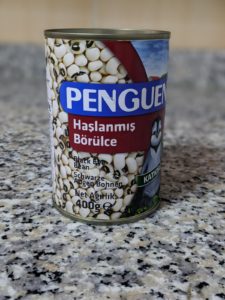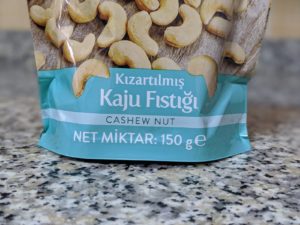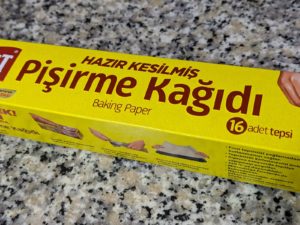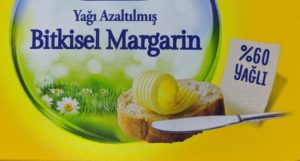Log in or register to save completed lessons.
Prerequisites for this Turkish Grammar Lesson
Negative verbs-mıyor
-mıyor musun?
-mamak
-(y)a
Using -(y)a with pronouns
nereye, buraya, şuraya, oraya
The many uses of the ‑mış ending
Besides the “normal” past tense ‑dı ending, there is another past tense ending in Turkish: ‑mış. The main use of ‑mış is for past events that the speaker did not witness. Besides this, ‑mış can mean a lot of different things. Its wide variety of uses makes it one of the hardest word endings to learn.
Using ‑mış on normal verbs
Since there are so many ways to use the ‑mış ending, this post will only focus on the ways you can use ‑mış on normal verbs (see table below).
| Function | Turkish example | English |
| Rumors | Ahmet yapmış | (I heard that) Ahmet did it. |
| Drawing conclusions | Ha, kuş ölmüş. | Oh, the bird must have died. |
| Surprise | Aa bak – Ayşe gelmiş! | Oh look – Ayşe came! |
| Compliments | Çorba güzel olmuş. | The soup is really good (Lit. Soup became good) |
| Baby talk | Oğlum bak ‑ kim gelmiş? | My son, look ‑ who do you think came? |
| Telling a story | Bir gün, Nasreddin Hoca’nın eşeği çalınmış. | One day, Nasreddin Hodja’s donkey was stolen. |
| Turning verbs into adjectives | Geçmiş olaylar | Past events |
So what’s the trick to it?
To make this simpler, we can combine rumors, conclusions, surprise, compliments and baby talk into a single grouping. To do this, Ayhan Aksu-Koç says the uses of ‑mış ending can be generalized as situations that are new for unprepared minds.[1] That is, you use the ‑mış ending when either you or others were not expecting something that happened.
How to form the ‑mış ending
Grammar form:
- Verb stem + mış/miş/muş/müş + (personal ending)
To use the ‑mış ending, first we need to determine the verb stem. For example, “yap” is the verb stem of “yapmak” (to do). After we find the verb stem, we add either ‑mış, miş, muş or müş. We choose the correct i-type vowel based on the last vowel in the verb stem. Next, we add the personal ending. That is, the ending that changes based on who (apparently) did the action. To get started making the mış ending, check out the table below, which has all the personal endings for the verb “gelmek” (“to come”). Note that in all of these examples, the i-type vowel is the dotted i because the vowel in the verb stem is “e.”
| (Ben) gelmişim | I came (apparently) |
| (Sen) gelmişsin | You came (apparently) |
| (O) gelmiş | He/she/it came (apparently) |
| (Biz) gelmişiz | We came (apparently) |
| (Siz) gelmişsiniz | You (plural or formal) came (apparently) |
| (Onlar) gelmiş(ler) | They came (apparently) |
Rumors and other reported speech
The most common usage of ‑mış is for repeating what you heard from someone else. For that reason, you will hear it often when people are repeating rumors or gossip. You can also find it in the headlines of news stories if the writer was not an eyewitness.
-
Examples
Tatile gitmişsin.
I heard you went on vacation.
(Title of a song by Tacettin Özcan)
55 gün yürümüşler.
They reportedly walked for 55 days.
(From the title of a news story)
Sahte hemşire 1.400 hastaya bakmış
A fake nurse reportedly cared for 1,400 patients.
(Title of news story)
Drawing conclusions based on evidence
Turkish speakers make a distinction between events that they personally witnessed and events that they learned about indirectly. That is why you cannot normally use the ‑mış ending on verbs to describe an event that you personally witnessed. If you do, it may be perceived either as deceitfulness or as poor grammar. However, the ‑mış ending does not always mean that the speaker is uncertain whether the event happened or not. The speaker may have seen clear evidence that an event happened, but if they did not witness it personally, they can use the ‑mış ending. This is especially common if the event was unexpected or surprising. Also, you can add the phrase, “demek ki” (“I suppose…”) to a sentence with ‑mış. When you say this, it is clear that you are making a guess or drawing a conclusion.
But there is a catch…
So it seems easy enough. But here is the tricky part: the ‑mış ending can only be used for drawing a conclusion if the evidence you are using is obvious to the person listening. In other words, if the other person does not see the evidence and you have not mentioned it, there is no way for them to know that you are making a guess. Instead, they will assume that you are using the ‑mış ending to mean that you heard it from someone else.
-
Examples
Uyumuşum!
I must have fallen asleep!
(A common thing to say after accidentally falling asleep)
Demek ki faydalı bir toplantı olmuş.
It looks like it was a helpful meeting.
(Title of news story)
2019 başlamış, ben kaçırmışım!
2019 has begun, I guess I missed it!
(Title of blog post about New Year’s resolutions)
Using the ‑mış ending for surprise
You can also use the ‑mış ending for showing surprise at something unexpected. There is overlap between this usage and the two usages above (rumors and conclusions). In other words, ‑mış is used especially in cases where the rumor or conclusion is surprising.
But once again, there is a catch…
There is one thing to note about this usage of the ‑mış ending, however. You can only use the ‑mış ending to show surprise for a short time after the event. That is, you can only use it as an immediate reaction to the situation that you were not expecting. But if you are talking about the situation long after the fact, you can not use the ‑mış ending to show surprise. If you do, it would only show that you were not a witness to the event. So this is tricky because there are some situations where you can use ‑mış for surprise but not for rumors or conclusions.
For example, imagine your friend Ahmet surprised you by showing up at your house unexpectedly. The moment you notice him coming, you can say, “Ahmet gelmiş!” (Ahmet came!). However, if you were talking about it the next day, you would have to say “Ahmet geldi” because you witnessed him coming. If you were to say “Ahmet gelmiş” after the fact, people think that you must not have been at home when he came.
-
Examples
Dilan’la Ferhat Kaçmış!
Dilan and Ferhat ran away!
(Title of an episode of the TV drama, Yeni Gelin)
Son otobüs gitmiş. Ne yapacağız peki?
The last bus left already! Well, what are we going to do?
(Excerpt from a story)
Compliments
Another common usage of the ‑mış ending is for compliments. As in the examples above, you might notice that this usage also contains an element of surprise. Using ‑mış in compliments is like saying the English word Wow! when someone did a good job.
-
Examples
Çorba güzel olmuş, ellerine sağlık.
The soup is really good, thank you! (Literally: Soup became good, health to your hands)
(A common way to compliment someone’s cooking)
Olağanüstü iş başarmışsınız.
You did an extraordinary job!
(Title of a news story)
Baby talk
As I noted above, the ‑mış ending is used in situations that are new for unprepared minds. Because of this, it is very common to use the ‑mış ending when talking with small children. This is because many situations are new for children, so their minds are unprepared even for everyday situations.
-
Examples
Bak ne getirmiş, bak bak!
Look, what did he bring? Look, look!
(Quotation from a character in a book talking to a child)
Küçük bir kedi gelmiş alışverişeeee…
A little kitten came to do some shopping…
(Caption of a photo of a little girl dressed as a kitten)
Using ‑mış when telling a story
In many Turkish stories in the masal (“fairy tale”) and fıkra (“anecdote”) genres, the ‑mış ending is used throughout the entire story. In this case, using the ‑mış ending is a signal to the listener that the story is fictional.
-
Example: Eşeğe Yardım Ediyorum Nasrettin Hoca Fıkrası
Nasrettin Hoca, bir gün eşeğine binip çarşıya gitmiş. Torbasını tıka basa doldurup omuzuna atmış. Tekrar eşeğine binip yola çıkmış.
Yolda karşılaştığı komşusu,
– Ya, hoca bu ne hal? Ne diye torbayı eşeğinde yüklemiyorsun, demiş.
Hoca cevap vermiş.
– Zavallı eşeğe yardım ediyorum. Zaten beni bile zor taşıyor!
One day, Nasrettin Hoca (teacher) got on his donkey and went into town. Filling his bag to the brim, he threw it over his shoulder. Then, getting back on his donkey, he went on his way.
His neighbor, whom he passed along the way, said to him,
– Hey, teacher, what is the deal? Why are you not putting the bag on the donkey?
The teacher responded.
– I am helping the poor donkey. He is already having enough trouble carrying just me!
(Source: Masal Oku)
Using ‑mış to turn verbs into adjectives
The ‑mış ending can also be used in a completely different way: turning a verb into a descriptive word (an adjective). For example, okumak is a verb that means “to read/study.” But if we add the ‑mış ending to it and put it before “adam” (man), it tells us about what the man has done. So, “okumuş adam” means “a man who has studied.” Likewise, “doymak” means “to fill” and “yağ” means “fat.” So, “doymuş yağ” is how to say “saturated fat.”
Since this form is useful for describing things, you will find it on a lot of labels for products and signs around Turkey. For examples of these, see the pictures below. And the next time you go to the store, look at all the labels on the things you see on shelves to see if you can find any more examples of the ‑mış ending like these.
-
Examples from product labels
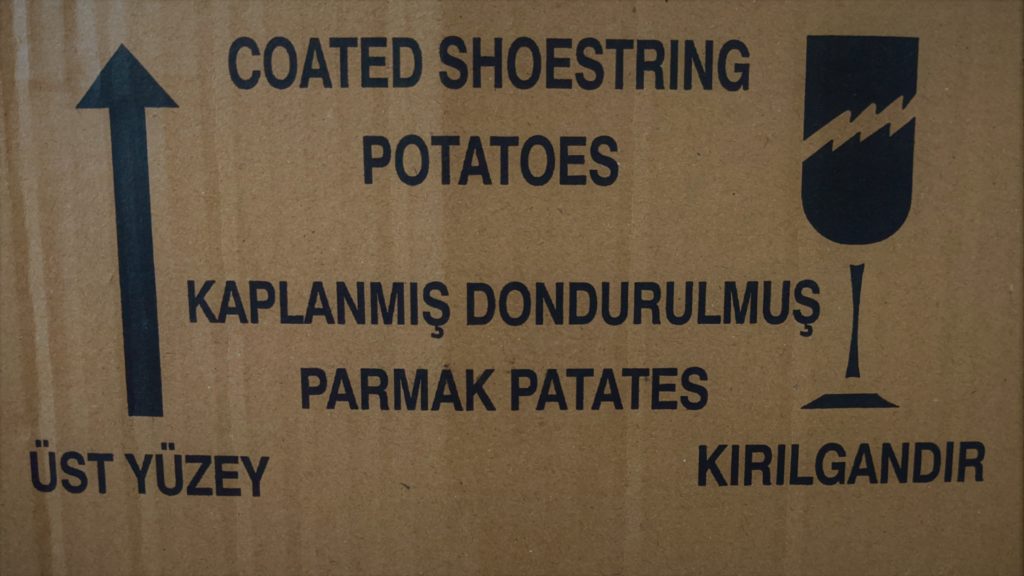
Kaplanmış dondurulmuş parmak patates
Coated, frozen french fries
Haşlanmış börülce
Boiled black eyed peas
Kızartılmış kaju fıstığı
Roasted cashew nuts
Hazır kesilmiş pişirme kağıdı
Ready-cut baking paper
Kurutulmuş domates aromalı ve fesleğenli patates cipsi
Dried tomato-flavored and basil-spiced potato chips
Yağı azaltılmış bitkisel margarin
Reduced fat vegetable margarine (lit., vegetable margarine that has had its fat reduced)
But wait, there’s more: the ‑mış ending on the i “to be” verb
The ‑mış ending also attaches to the Turkish “to be” verb i to form imiş. This imiş word can then attach to a wide variety of words and phrases. And each of these has more than one possible meaning, depending on the context. So, you can see why we say that the ‑mış ending is hard to learn! See below for some examples of how the ‑mış ending is used with the i “to be” verb:
| Turkish example | English |
| Memurmuş / memur imiş | He/she is/was an officer (apparently) |
| Yaşlıymış / yaşlı imiş | He/she is/was old (apparently) |
| Oradaymış / orada imiş | He/she is/was over there (apparently) |
| Oymuş / o imiş | He/she is/was that one (apparently) |
| Geliyormuş / geliyor imiş | He/she is/was coming (apparently) |
| Gelirmiş / gelir imiş | He/she will come / generally comes / used to come (apparently) |
| Gelecekmiş / gelecek imiş | He/she is/was going to come (apparently) |
| Gelseymiş / gelse imiş | If only / I suppose that if he/she had come… |
| Gelmeliymiş / gelmeli imiş | He/she is/was supposed to come (apparently) |
| Gelmişmiş / gelmiş imiş | They say that he/she came, but I do not believe it. / He/she had come (apparently). |
More advanced ‑mış forms
In addition to the many forms listed above, the ‑mış ending can be used together with either the olmak verb (“to be/become”) or with değil (“not”) to make complex grammar forms that have a wide variety of applications. This post does not discuss these advanced forms, but if you are interested in learning more about them, check out these two posts:
Sources
[1] Aksu-Koç, Ayhan. THE ACQUISITION OF ASPECT AND MODALITY: The case of past reference in Turkish. Department of Psychology, Bogaziçi University, Istanbul. Accessed 02/20 from https://pt.b-ok2.org/book/994403/5deaa7
This lesson is a prerequisite for:
Using “ki” to say “that”ki
Introducing quotations
Using "ki" in expressions, exclamations, and parenthetical comments
Bir gün bizim bir amcamızın bir manavı vardı, benim dükkanımın karşısında. Böyle oturuyok 6 7 kişi falan. Amcamın da o gün köyden...
-mıştı
-mamıştı
-mış mıydı?
-dıydı
-(ı)n
-(ı)l
Exceptions
-mış olacak
-mış olacaktı
-mış olmak
-mış olur
-mış değil
-ıyor değil
-acak değil
Vocab: "insan," "kişi"

